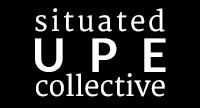Situated Urban Political Ecology (SUPE) is a work in progress, the building of a way of understanding cities that takes their differences seriously while striving to learn from difference across contexts.
SUPE builds on a number of different literatures and experiences:
- The concern that urban environmental research in African cities is approached through conventional policy and practice. While there has been some research which has used the environmental justice lens, and some use of urban political ecology (UPE) there remains a paucity of critical research into African urban environments (Myers, 2008; Lawhon, 2013).
- The call to seriously consider the relevance of urban theory for cities in the South, and allow for a wider range of cities to inform urban theory (Robinson 2006, Roy 2009). To provincialize (Chakrabarty, 2000) UPE is to develop a way of framing that is more attentive to subjectivity and situation and that can question taken-for-granted ideas in order to broaden the scope for theorizing with more urban experiences in mind.
- Urban political ecologies, which have typically worked within a Marxist framing (Heynen et al., 2006). While there is much utility to this approach, we seek to expand the range of theoretical influences on UPE, especially in light of the call to provincialise urban theory.
A situated UPE creates the possibility for a broader range of urban experiences to inform theory on how urban environments are shaped, politicized and contested. It is not our intention to suggest that such a provincialization can only or even best be undertaken through engagement with African urban research, but to begin opening a space for the development of a more theoretically heterogeneous UPE.
Two key publications (in Antipode and Regional Studies) seek to conceptually frame the SUPE, bringing together these outlined concerns and providing our response to these imperatives; more collective works are also in progress.


